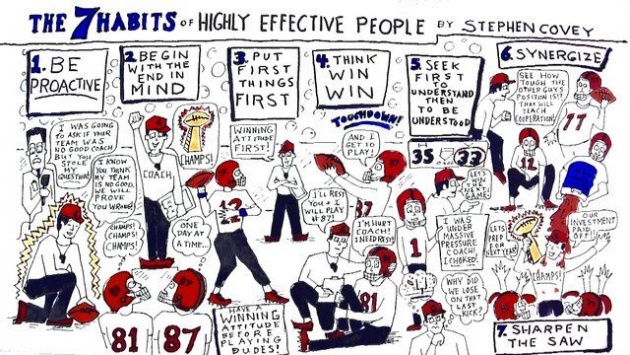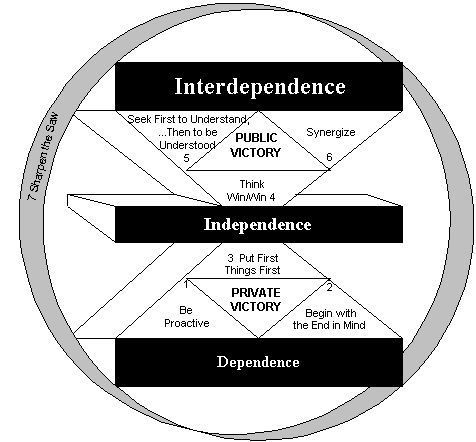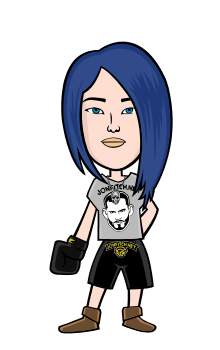A mindset to succeed the journey to a successful life
A few years ago I followed a very interesting curriculum about: The Seven Habits of Highly Effective People. based on the book written by the American author Stephen Covey. I worked a number of years in the education system and must say that I found this a very useful lessons. The curriculum is praised in the business world but is also very useful for caregivers and teachers and parents. Actually, it makes sense for everyone, even children can be made aware of the seven characteristics of effective leadership. The properties can be best seen as skills you train yourself to make the habits your own. What Covey exactly means by effective leadership is actually pursuing success. This can be: successful in the business area but it also be successful on a personal level.
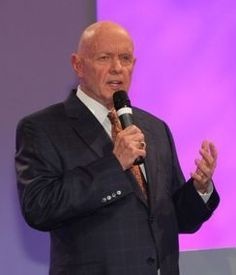
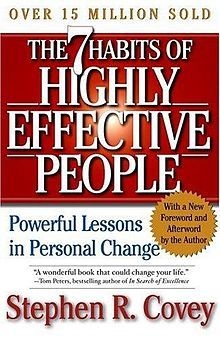
Picture forbes.com : Stephen Covey (Salt Lake City, 24 October 1932 – Idaho Falls, 16 July2012
You can click if you want to know more about Stephan Covey
The first three habits are related to individual development. They teach you to make you as independent person.
1. Be proactive
2. Be purposeful (Begin with an end in mind)
3. Set your priorities
The fourth, fifth and sixth characteristic have focussed on the work effectively together
4. Strive for joint profit (create a win-win situation)
5. Seek first to understand than to be Understood
6. Synergise (take advantage of other people's differences and work together)
The seventh feature is required for the operation of the other six.
7. Sharpen the saw (Take plenty of rest and relaxation.

http://www.theappliciousteacher.com
1. Be proactive
What is being proactive? Being proactive does not mean just taking initiative, but proactive people don't victimize themselves. They take responsibility for their lives. They do not slip off their responsibility to external factors in life but they are focusing on their own thoughts,
An important principle is that the circle of influence and control of the circle, and the circle of involvement, as you can see in this example:
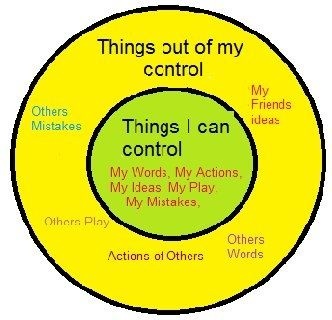
source: pinterest.com
Covey said you can not change the things you do not have an effect on, but you do have the influence to determine how you want to deal with the thing you can control
The opposite of proactive is reactive. Reactive people often are concerned about things they have no control over.

Source: pinterest.com
Example 1: The techniques are changing and it can be that many entrepreneurs suffer from this devolopement. A reactive entrepreneur will complain about the good materials that disappear but a proactive company knows that he has no influence on the technology so it realizes there is no point to complain about that. This entrepreneur instead spends his time searching for a new hitech gadgets to bed the market.
Example 2: If you are looking for a job and you are proactive Before youw write your letter you pick up the phone and call the company you want to apply for a job. You show that you are interested in the position. If you are rejected you do not complain that it is so difficult to find a job. Since you have no influence on that. You keep doing what you can do to improve yourself
source: www.theappliciousteacher.com
2. Be focused:
Begin with an end in mind and know where you want to go. Effective people have a clear focus. Covey has a clear purpose analog:
You can always harder climb the ladder but when your ladder stands before the wrong building, you will never come where you want to be. You must first select your targets before you can climb a ladder
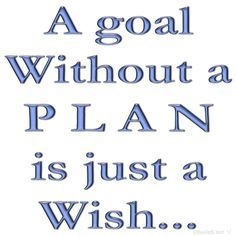
(I have read this on a blog on this website: http://www.expanded.nl/nl/438/hr-blog/de-7-eigenschappen-van-effectief-leiderschap---Stephen-cover---boekbespreking).
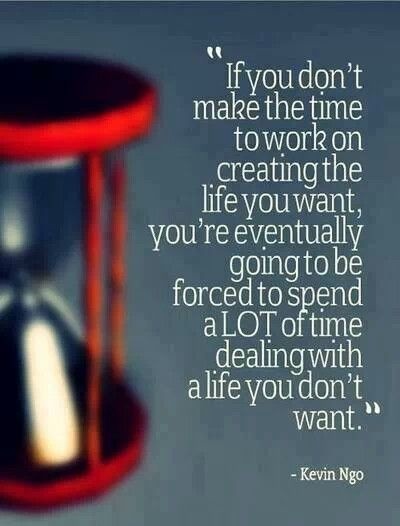
Source: pinterest.com
Covey recommends you to create a personal mission statement for your life. You can see it a little bit as a guide for your life. Where are you going and what are your needs? If you know what you may want it get's easier to achieve your goals.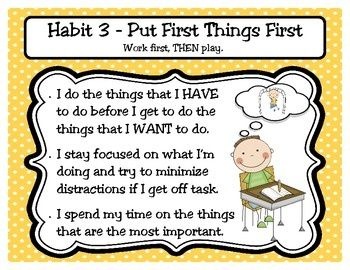
source: www.theappliciousteacher.com
3. First things first
What do you want to achieve? And is it that you want to achieve feasible? In summary set priorities. Covey has made a practical model called the Covey quadrant. According to Covey, you must focus on the second box. (Not important) It is therefore, important to focus on the important things, not urgent. Learn to say no. Urgent things you can not change. If you do you will impose your focus on the urgent goals and you will have no time for the things that are really important.
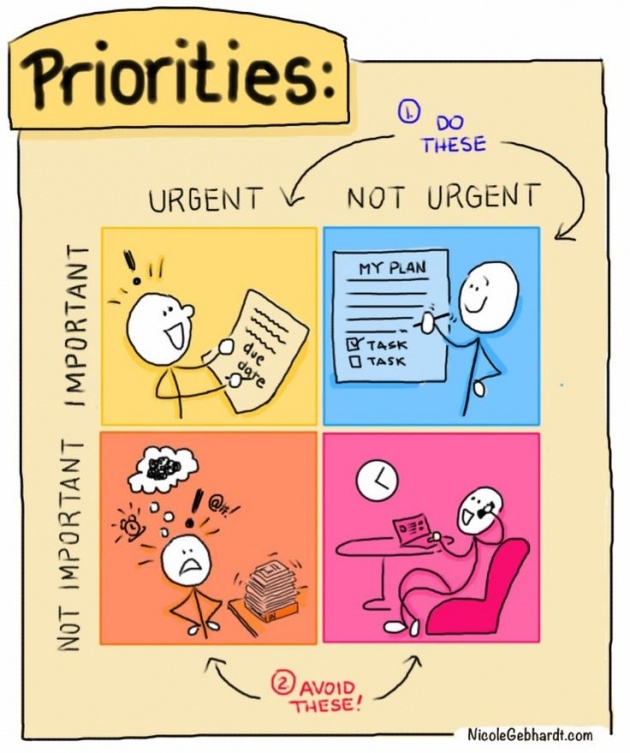
It is a very useful model for people who find it difficult to keep track of their activities. I am such a type that can be quite drawn into the gene that comes on my path that I do the things I wanted to do to lose out.
For example, I want to learn to play the piano. This is not urgent but important. If I do not take time to practice each day, I will never follow in the footsteps of Mozart. (:-P) Because of the daily distractions it is tending lose focus and skip the piano to do your heavy laundry.
Emotional bank account:
The emotional bank account Covey coined as a metaphor. For every interaction is a positive or negative reaction poured into the bank account.
People who are negative about people in their way of talking, criticizing or unkind will experience that at some time they add a negative balance on the account of the received one. While people who speak positively about others build a positive balance in the emotional bank account recipient. Sounds pretty logical anyway. What you give actually you get back..
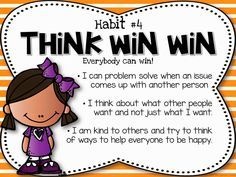
source: www.theappliciousteacher.com
4. Create a win-win situation.
A win-win situation is a situation where everyone benefits. This is taken into consideration also.
Most people think that if they win somebody else has to lose They want to gain at the expense of the loser but on the long-term that is not always a good solution.
Covey believes that the best thing for you as a base for interaction win-win or no deal.
Sometimes it is true that at the start of business relationship you can choose for a win / lose situation because it can also be a good starting point as an investment that will pay on time.
Whereby positive balance your emotional bank account of another is likely to grow.
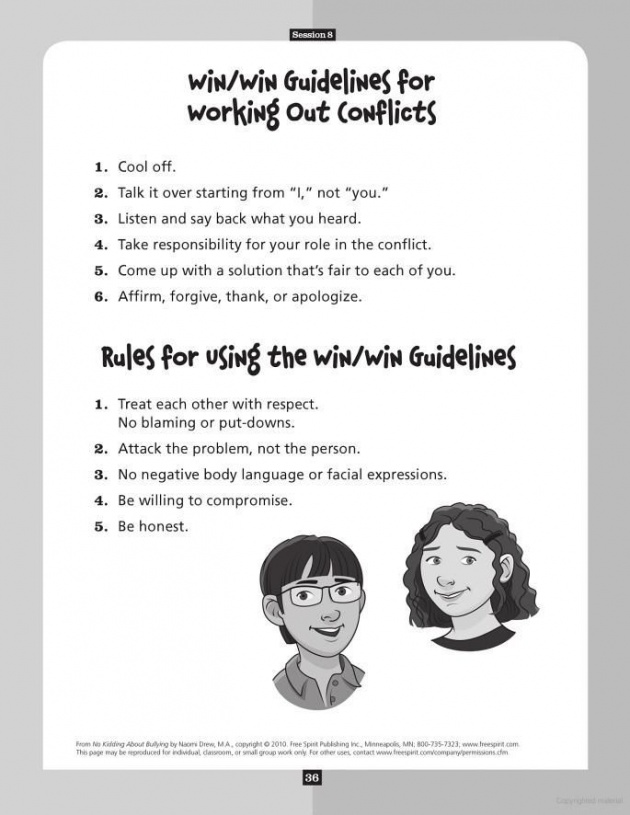
Source: pinterest.com
Take for example Nelson Mandela: He could have entered the apartheid for whites. He had every right too. But he did not. He opted for reconciliation so he created a win-win situation for white and black Africans. Which gave him a lot of credit to his emotional bank account.
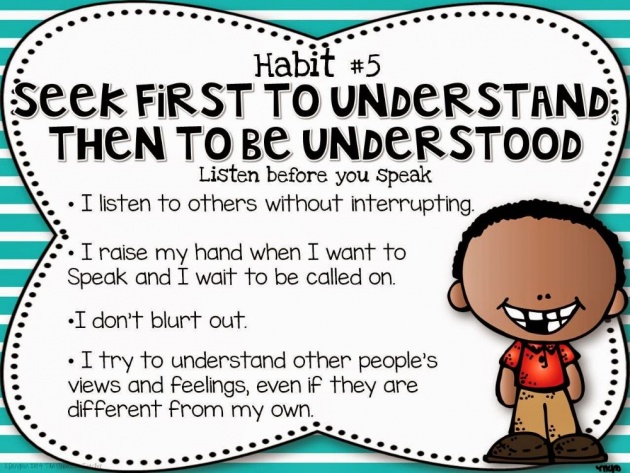
source: www.theappliciousteacher.com
5. Seek first to understand, then to be Understood.
Try to have an ear for the story off another person before you expect the other one understands you. It is important to listen carefully to the other person instead wanting to come forward with you're own story. This may arise creating inspiring ideas yourself also just better be. Mo
"When you talk, you are only repeating what you already know. But if you listen you may learn something new."Dalai Lama
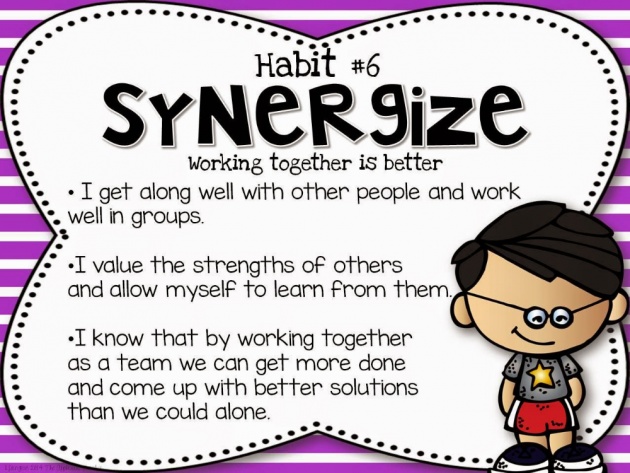
source: www.theappliciousteacher.com
6. Synergize:
Synergy (Greek: synergy, collaboration )is the creation of a whole that is greater than the simple sum of its parts of a whole
If you want to manage something and produces something, it is often better to join forces and you need other people to achieve your desired goal.
Covey gives an example of a man and a woman making plans for the holiday but they both want something different. The man wants to fish but the wife wants to visit her sick mother. The man understands that his wife wants to see her mother. The woman understands that her husband wants to do something with the whole family.
By thinking out win-win they quickly come up with the idea of a fishing conditions in nearby the house of her mother. Because of an open attitude to new ideas which everyone can be happy with. If the the man or the woman had gone for their own profit it could have turned out into a big fight.
This movie is an excellent example of how you can make a difference. There is a tree on the road. People are making noise and honk their wheel. They are in all circle of control. Except for one little boy who uses his influence to power the other people to help. Watch the movie and see how synergize works
source: www.youtube.com
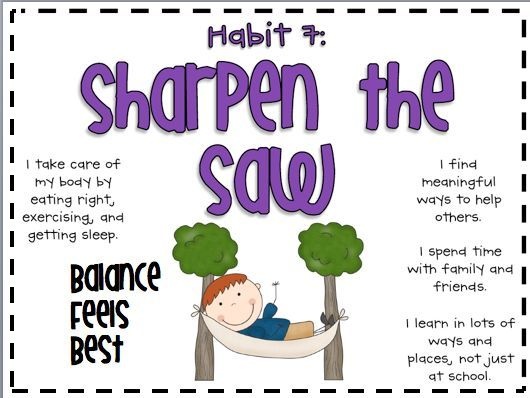
source: www.theappliciousteacher.com
7. Sharpen the Saw:
The name comes from a story about a woodcutter:
A man walks through the woods and sees a lumberjack, who has worked himself into sweat to cut a tree. The man asks the woodcutter what he is doing. "I have to cut this tree down for tonight!" The woodcutter answered. The man says: "But the saw is completely blunt Take a break to hone him, then you're really faster!". "No," replied the woodsman, "I do not have time to sharpen him, that tree still need to be cut today!
In other words: sometimes it is time to sharpen. Open to innovation. Taking care of your body and mind. But also plenty of sleep and meet up with your friends and family are important issues that should not be forgotten.
Covey distinguishes four dimensions that need to be maintained. Body, mind, heart and soul. Which is shown on the figure below: It is important to keep the dimensions balanced. Otherwise you won't be able to seek the other six habits.
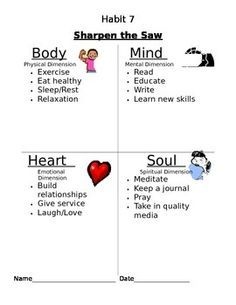
Source: pinterest.com
The movie is about the 7 habits. These will be explained by cartoons and drawing. Very nice to watch if you are interested:
www.youtube.com
When I completed the curriculum about these 7 habits I noticed that this knowledge had a greater impact on me than I could imagine and it is very useful for me to grow as a person. That is mainly the reason I want to share my knowledge about this subject cause maybe it is useful for you as well. It's not that I always live by these 7 rules cause I am human and I have my weaknesses is too. The instructor of the course said that is was all bout making that Mind sweep. It is indeed much easier to stay in your comfort zone. Just sit on the couch or at the office and blaming everyone for what went wrong in your life. But it doesn't bring you anywhere. As soon as you can make that mind sweep and use these 7 habits it can lead to effective leadership. As Covey wisely spoke:"Nobody would ever say on his dead bed I wish I had spend more time in the office."
My sources(Dutch):
http://test.spagaat.com/covey_uitgebreide_samenvatt.pdf
http://123management.nl/0/030_cultuura300_cultuur_16_covey_zeven_eigenschappen.html
http://wij-leren.nl/de-zeven-eigenschappen-van-effectief-leiderschap.php
http://438/hr-blog/de-7-eigenschappen-van-effectief-leiderschap---stephen-covey---boekbespreking
If you are interested this is a link to a summary of the book 'Seven habits of highly effective people' http://www.quickmba.com/mgmt/7hab/
